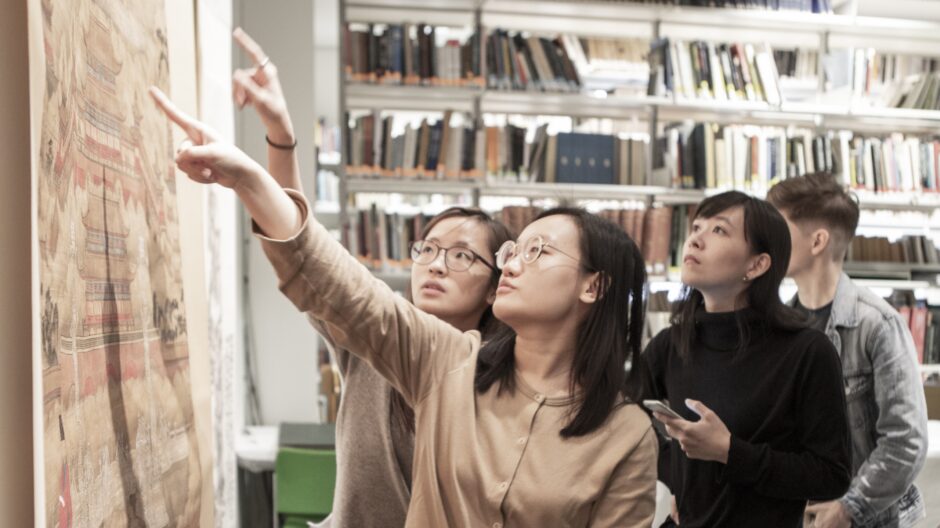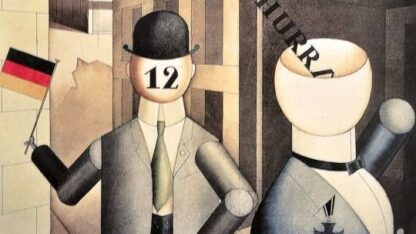Course Overview
Status
Applications Open
Location
Vernon Square Kings Cross, London WC1X 9EP (during The Courtauld Connects project)
Duration
9 months, full-time
Awarding body
University of London
Intake
200 - 250 students per year
The Courtauld MA in the History of Art provides the best in research-led teaching by world-class faculty members in a unique, single subject setting. It is renowned for offering outstanding training in the specialised analytical and communication skills necessary for further research or for employment in the arts sector and across a wide range of careers. The programme excels at developing well-rounded and intellectually astute art historians and museum professionals equipped to make an important contribution to public life.
According to the prestigious QS World University Rankings 2023, The Courtauld has been ranked as one of the top three universities worldwide for the study of History of Art. The MA History of Art is one of the largest graduate Art History programmes anywhere in the world, and offers an unrivalled combination of breadth and depth. At its broadest, teaching brings together the whole cohort, so that students in our ‘Methodologies in Conversation’ sessions are exposed to a wide range of different voices and perspectives on issues of current art historical concern. MA students are also invited to join our longstanding ‘Foundations’ lectures, offered across The Courtauld, which offer a wide introduction to Art History across a broad range of places and periods. At a middle level, ‘Shared Interest’ classes address issues pertinent to those working on specific periods in the History of Art, including Byzantine & Medieval Art, Renaissance Art, Early Modern Art and Modern & Contemporary Art.
Our most focused classes are our Special Option classes, ordinarily taught in small groups of 8-10 students, and closely tied to the research specialisms of your teachers. Each year, The Courtauld offers a changing menu of over twenty Special Options, ranging from the early Middle Ages to the present, and from Britain, Europe and North America to Iran, China and Latin America. Stretching across two semesters, these classes provide an unparalleled immersion in the scholarship and issues pertinent to your chosen field. MA History of Art students are also warmly invited to continue to expand their engagement with new art-historical research by attending the almost daily series of seminars and conferences organized by The Courtauld’s Research Forum.
Entry Requirements
UK qualifications: Students will normally have achieved a good 2.1 in their Bachelor’s degree (typically in the Humanities or Social Sciences), considered to be an overall average of 65% or above.
Overseas qualification: Equivalent to a good 2.1 in a UK first degree (e.g. US applicants should have a cumulative GPA of 3.5 or above).
Please note that applicants are occasionally invited to interview on a case-by-case basis.
English language requirements: If your first language is not English, we require proof of English language proficiency –please see the English Language Requirements page.
Teaching and programme structure
The Courtauld MA History of Art combines a range of teaching methods and learning strands. One to one tutorials ensure you get tailored feedback on ideas for your assessments from your Special Options tutor. Special Option classes typically take the form of small group seminars, but may also include exhibition or site visits, and – depending on topic – sometimes include trips in or beyond London or the UK. Shared Interest sessions bring together different Special Options groups to discuss issues of shared relevance to those working on broad historical periods. ‘Methodologies in Conversation’ sessions in the first semester are led by two faculty members, who typically approach issues of shared art-historical concern from the perspective of different places and periods. These Methodologies sessions are delivered in hybrid format, so students can choose to attend them online or in person. .
Feedback from a range of writing and presentation tasks in the first semester helps students to research and write a 4000-word Assessed Essay, supported by tutorials with their Special Option tutor. Further tutorials in the second semester help students prepare a second Assessed Essay and a Virtual Exhibition, an exercise that encourages students to conceive an (imaginary) exhibition, judiciously selecting exhibits and writing, for example, a sample wall label and catalogue entry. The Virtual Exhibition often produces some of our students’ most original and inventive work, and has served for many as a stepping stone into issues of museology and curating. In the second semester students also begin to research and write their 10,000 word Dissertation, which is submitted in the summer and benefits from one-to-one tutorials and feedback from a draft. The dissertation represents 50% of the overall degree classification and the results are often highly original contributions to scholarship across a wide field, regularly commended by external examiners for being of publishable quality.
Assessment
The formal assessment of MA History of Art is based on the following four components:
- A 4,000 word essay relating to the special option, valued at 15% of the overall degree classification (Semester 1).
- A second 4,000 word essay relating to the special option, valued at 20% of the overall degree classification (Semester 2).
- A virtual exhibition assignment, involving the selection and presentation of works of art to be included in an exhibition addressing a particular theme, valued at 15% of the overall degree classification (Semester 2).
- A 10,000 word dissertation, researched and written over a period of approximately three months with supervision from the special option leader. The dissertation is valued at 50% of the overall degree classification (Summer).
Fees and Funding
Fees are subject to change each academic year. Fee information, including what qualifies as home, EU, and overseas fees, can be found here.
Financial support for your studies:
Postgraduate Master’s Loan: Please visit the Student Finance England website for further information and to apply online.
Courtauld Institute of Art Scholarships: Every year the Courtauld provides over half a million pounds in MA scholarships, which are awarded on the basis of academic merits. The average postgraduate scholarship is £6,000. Applications are welcomed from Home, EU and Overseas applicants and students. Find out more about our scholarships.
Alumni Loyalty Scheme: This scheme is open to any graduate of The Courtauld Institute of Art admitted to a taught postgraduate programme of study. Recipients will receive a 10% loyalty discount off their tuition fee for the duration of the course.
Meet our students and alumni
Meet our students
Yu: The study at The Courtauld is intense but fruitful at the same time. I studied Economics as an undergraduate and approached the world from very different perspectives. At the Courtauld, I have started learning Dutch and Latin and acquired completely new ways to explore art, history, and culture. I have realized art is a very complicated concept that is intertwined with many others, and that the interpretation of artworks should be based on the reconstruction of their specific social, political, and historical context. Surprisingly, studying Netherlandish art has also offered me new lenses to examine the culture that I come from. The Courtauld has turned what was invisible to me into exciting discoveries – I would say this is a life-changing experience.
Nina: One of my favourite things about the course is that, although you specialise in your period, there are evenings talks that cover a range of topics. I found the careers programme particularly useful. The alumni networking event gave us an opportunity to talk to successful Courtauld graduates and discuss the the next step in our career. Looking back over the year fondly, the study trip to Rome in January was a personal highlight. A travel fund from the University made the trip accessible for everyone.
Meet our alumni
Naomi Beckwith (MA 1999) – Public Museums
Naomi Beckwith is Deputy Director and Chief Curator at the Guggenheim Museum, New York. She was previously Senior Curator at the Museum of Contemporary Art Chicago (MCA) and was featured in Chicago Magazine’s ’50 Most Powerful Women in Chicago’ list in 2020. Naomi has also worked at the Institute of Contemporary Art, Philadelphia, and the Whitney Museum of American Art, New York. Her curatorial work focuses on the deficit of people of colour and women in the western art-historical canon, multi-disciplinary art practices and respecting cultural differences in an age of globalisation.
Ashitha Nagesh (MA 2013) – Journalism
Ashitha Nagesh is an award-winning journalist at BBC News. She has also produced pieces for BBC World Service Radio and BBC Radio 4 and has discussed her work on BBC Outside Source on World Service Radio, BBC Radio 2’s Jeremy Vine Show, BBC Scotland’s Podlitical and BBC Asian Network, amongst other radio shows. She previously worked as a Senior News Reporter for Metro and was a freelance art journalist for several years, writing articles for Apollo, Artforum, Art Press and many other arts publications.
Careers and Employability
The MA programme is designed to produce graduates with highly transferable skills, preparing you for a wide range of employment opportunities, or further academic study. Our graduates are not only equipped with a detailed knowledge and understanding of the History of Art, but also learn how to:
- Analyse visual imagery and articulate sophisticated arguments in formal writing and in oral presentations.
- Read critically and economically.
- Assimilate complex material.
- Formulate and express a broad range of different ideas.
- Present research to a varied audience.
- Develop independent research skills.
- Experience collaborative work in groups.
With these skills, Courtauld graduates go on to further study and to jobs across the economy including:
Academics, Curators, Conservators, Art Dealers, Auction House experts, Lawyers, Entrepreneurs, Publishers, Media professionals, Teachers, Banking and Finance, Journalists, Business / Marketing & Communications, Fashion buyers, Civil servants
You can access bespoke, one-to-one careers guidance throughout your studies. The Courtauld Careers Service offers advice and support on exploring career and further study options, finding internships, enhancing employability, understanding and navigating the jobs and self-employment market, and making successful applications. This service is available to all graduates for up to two years after graduation.
Support
To support you through the degree, we offer:
Wellbeing: We have a dedicated Wellbeing team, with counsellors and advisors.
Academic Skills: The academic skills tutor offers group and one-to-one sessions to help develop the skills and confidence you need to succeed on the degree. We also have two Royal Literary Fund fellows who will help you with your writing skills – concentrating on how to structure and improve your writing.
Get Involved Now
The Research Forum deliver an extensive programme of lectures, conferences, workshops and seminars supporting advanced inquiry into the History of Art, Conservation and Curating. We host around 150 events per year, from research group seminars to lecture series catering to a wider interest. Our varied programme of events look to different periods and themes in art, visual culture and its history. Explore upcoming events, and watching recordings of previous events, here.
The Courtauld Gallery is home to one of the greatest art collections in the UK. The gallery is most famous for its iconic Impressionist and Post-Impressionist masterpieces– such as Van Gogh’s Self Portrait with Bandaged Ear and Manet’s A Bar at the Folies-Bergere – but also displays major paintings, drawings and decorative arts from the Middle Ages through to the 21st century. Tickets to The Courtauld Gallery’s main collection are free for students. You can book your ticket here. You can also explore the Gallery virtually here.

























